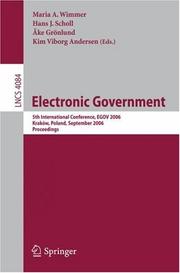| Listing 1 - 10 of 10 |
Sort by
|
Book
ISBN: 9780230224896 023022489X 1349309702 9786612050220 1282050222 0230227295 Year: 2009 Publisher: [Basingstoke England ; New York] : Palgrave Macmillan,
Abstract | Keywords | Export | Availability | Bookmark
 Loading...
Loading...Choose an application
- Reference Manager
- EndNote
- RefWorks (Direct export to RefWorks)
Book
ISBN: 2110044268 9782110044266 Year: 1999 Publisher: Paris: La Documentation française,
Abstract | Keywords | Export | Availability | Bookmark
 Loading...
Loading...Choose an application
- Reference Manager
- EndNote
- RefWorks (Direct export to RefWorks)
Government publicity --- Electronic government information --- Internet in public administration --- Information d'Etat --- Information sur l'Etat électronique --- Internet dans l'administration publique --- 001.9 <44> --- 35.077.55 <44> --- 025.4.036 --- Information sur l'Etat électronique
Book
ISBN: 9041124365 9789041124364 Year: 2007 Publisher: The Hague: Kluwer law international,
Abstract | Keywords | Export | Availability | Bookmark
 Loading...
Loading...Choose an application
- Reference Manager
- EndNote
- RefWorks (Direct export to RefWorks)
Governments across the world have recognised the potential of new information and communication technologies (ICTs) to bring about fundamental renewal in not only government and public sector processes, but also their relationship with civil societal groups, the private sector, citizens, and various other actors. ICT provides enormous opportunities to increase efficiency and effectiveness in all kinds of policy sectors, and promises a real dialogue between policy makers and the public. This second edition of the prescient and influential work first published in 2001 includes updated texts of several chapters from the earlier edition as well as various chapters, among them a number of country reports written for the e-government session of the of the 17th World Congress of Comparative Law. In addition to visions of the concept of electronic government, it provides examples of already active electronic governance by including various chapters on developments in the United States (both federal and state), the United Kingdom, Canada, Germany, Italy, Denmark, and the Netherlands. It draws valuable lessons (cross-national, between policy sectors and across administrations) from the design of electronic government and from evaluations of electronic government in practice. Aspects of e-government covered in the second edition include the following: government initiatives such as e-publication, online filing (including e-procurement and courts e-filing); 'e-democracy' features such as e-voting, e-participation, e-consultation and e-petitioning; benefits of government use of such expanding technologies as global positioning systems, smartcards, and biometrics; benefits to citizens services such as social security and services in the health care sector; applications to the judicial system and law enforcement; differences between developments and policy initiatives in various countries; and, obstacles and dilemmas touching upon security, surveillance, identity fraud, liability, intellectual property, free access, national security, equality, and privacy. Especially in its close attention to the interaction between legal, practical, public administration and ethical obstacles and dilemmas, "Designing E- Government, Second Edition" is of enormous value to practitioners, officials, and policymakers concerned with the legal implications related to the design and implementation of e-government, and with the present and future challenges of this endeavour.
Government --- Information systems --- Public administration --- Internet in public administration. --- Internet in public administration --- Electronic government information. --- Electronic public records. --- Internet dans l'administration publique --- Information sur l'Etat électronique --- Archives publiques électroniques --- Case studies. --- Cas, Etudes de --- Information sur l'Etat électronique --- Archives publiques électroniques --- Internet in public administration - Case studies.

ISBN: 1573564796 Year: 2004 Volume: *1 Publisher: Westport ; London Greenwood Press
Abstract | Keywords | Export | Availability | Bookmark
 Loading...
Loading...Choose an application
- Reference Manager
- EndNote
- RefWorks (Direct export to RefWorks)
International agencies --- Government information --- Electronic government information --- Non-governmental organizations --- Organisations internationales --- Information sur l'Etat --- Information sur l'Etat électronique --- Organisations non-gouvernementales --- Information resources. --- Handbooks, manuals, etc --- Directories --- Bibliography --- Sources d'information --- Guides, manuels, etc. --- Répertoires --- Bibliographie --- Information sur l'Etat électronique --- Répertoires --- Handbooks, manuals, etc. --- Bibliography.
Book
ISSN: 01840886 ISBN: 9782765415305 2765415307 Year: 2017 Volume: *138 Publisher: Paris: Éd. du Cercle de la librairie,
Abstract | Keywords | Export | Availability | Bookmark
 Loading...
Loading...Choose an application
- Reference Manager
- EndNote
- RefWorks (Direct export to RefWorks)
La 4e de couverture indique : "Le terme de communs du savoir désigne une activité collective et horizontale visant à créer, maintenir et offrir des savoirs en partage. Le développement du numérique a démultiplié les potentiels de création et de diffusion des connaissances, au point d'offrir une opportunité extraordinaire pour construire une société du savoir ouvert et partagé à l'échelle du monde. L'accès au savoir est un droit fondamental et le Manifeste de l'Unesco sur la bibliothèque publique rappelle que les bibliothèques demeurent des institutions facilitatrices et garantes de cet accès de tous aux savoirs, à leur préservation, à leur circulation. Il existe indéniablement un lien intime entre bibliothèques et communs du savoir. Mais, en parallèle, une série de stratégies technique, économique ou juridique visent à limiter la circulation et le partage de l'information et du savoir. Ce mouvement d'enclosure n'est pas l'unique fait des acteurs privés ; des institutions publiques, dont des bibliothèques, contribuent également à cette fragilisation des communs de la connaissance. Or, les bibliothèques sont les lieux par excellence de la protection, du développement et de la promotion des communs du savoir. Elles incarnent une politique publique d'accès libre et ouvert aux savoirs et reconnaissent à la connaissance partagée un rôle moteur dans le développement des sociétés. C'est l'approche développée dans cet ouvrage, au travers de trois grands champs d'action offerts aux bibliothèques la préservation et la valorisation des biens communs du savoir, la participation à leur enrichissement, le soutien à l'émergence de leur cogestion par les différents acteurs qui les créent ou qui se les approprient"
Bibliothèques publiques -- Finalités --- Données ouvertes --- Bibliothèques -- Services aux publics --- Finalités --- Services aux publics --- Public libraries --- Electronic government information --- Public services (Libraries) --- Knowledge management --- Bibliothèques publiques --- Information sur l'Etat électronique --- Bibliothèques --- Gestion des connaissances --- Aims and objectives --- Services aux usagers --- Bibliothèques publiques --- Information sur l'Etat électronique --- Bibliothèques --- Finalités
Book
ISBN: 9782233010025 2233010027 Year: 2022 Publisher: Paris : Éditions A. Pedone,
Abstract | Keywords | Export | Availability | Bookmark
 Loading...
Loading...Choose an application
- Reference Manager
- EndNote
- RefWorks (Direct export to RefWorks)
La communication médiatique est une composante de plus en plus importante de l'activité diplomatique des États. Ce que les spécialistes des relations internationales désignent couramment comme la diplomatie publique a pris ces dernières années un essor remarquable en raison du développement exponentiel des réseaux sociaux, que les États ont pleinement intégrés aujourd'hui à leur politique étrangère, y inclus leur politique juridique extérieure. La communication médiatique des États interpelle directement de ce fait le droit international. Le présent ouvrage, qui publie les actes du colloque organisé par le CEDIN à l'Université Paris Nanterre le 14 juin 2019, vise à mieux identifier ces relations entre la communication médiatique de l'État et le droit international. Quels sont les enjeux contemporains de la diplomatie numérique ? Quelles sont les limites au droit de l'État de communiquer ou de ne pas communiquer ? Comment la communication médiatique de l'État sur les questions juridiques internationales s'élabore-t-elle ? Dans quels cas une communication médiatique vaudra-t-elle traité ou acte unilatéral engageant l'État, ou participera-t-elle à la formation de la norme coutumière ? En matière de responsabilité internationale, quelle est la portée de la distinction entre communication personnelle et communication officielle ? Une communication médiatique de l'État peut-elle constituer une menace de l'emploi de la force ou une incitation à la violence ? Quel est la place de la communication médiatique dans le champ du règlement des différends internationaux ?
Diplomacy --- Diplomatie --- Government information --- Information sur l'état --- International relations --- Relations internationales --- Electronic government information --- Information sur l'État électronique --- Information sur l'État --- Mass media --- Médias --- Relations internationales. --- Technologies de l'information et de la communication --- État. --- Médias et relations internationales. --- Diplomatie. --- Médias et relations internationales.
Book
ISBN: 9780199557721 0199557721 Year: 2013 Publisher: Oxford : Oxford university press,
Abstract | Keywords | Export | Availability | Bookmark
 Loading...
Loading...Choose an application
- Reference Manager
- EndNote
- RefWorks (Direct export to RefWorks)
Internet in public administration. --- Electronic government information. --- Internet dans l'administration publique --- Information sur l'Etat électronique --- #SBIB:35H24 --- #SBIB:35H501 --- Electronic government publications --- Government information --- Government publications --- Digital government --- E-government --- Electronic government --- Online government --- Public administration --- Informatiemanagement bij de overheid --- Bestuur en samenleving: netwerken, inspraak, participatie, interactief beleid --- Computer network resources --- Information sur l'Etat électronique --- Electronic government information --- Internet in public administration

ISBN: 9780765617279 0765617277 9780765617286 0765617285 131570305X 1317466705 9786610912780 1280912782 0765621762 9780765621764 9781280912788 9781317466703 6610912785 9781315703053 9781317466680 9781317466697 1317466691 Year: 2007 Publisher: Armonk, N.Y. M.E. Sharpe
Abstract | Keywords | Export | Availability | Bookmark
 Loading...
Loading...Choose an application
- Reference Manager
- EndNote
- RefWorks (Direct export to RefWorks)
Introduces public management students and government and nonprofit administrators to the practices of Knowledge Management. This book focuses on knowledge management techniques in government agencies, and it covers such concepts as collecting, categorizing, processing, distributing, and archiving critical organization data and information.
Knowledge management. --- Organizational learning. --- Public administration --- Electronic government information --- Gestion des connaissances --- Apprentissage organisationnel --- Administration publique (Science) --- Information sur l'Etat électronique --- Information technology --- Technologie de l'information --- #SBIB:35H24 --- #SBIB:309H1720 --- #SBIB:309H1730 --- Informatiemanagement bij de overheid --- Informatiekunde, informatie management --- Artificiële Intelligentie, knowledge engineering, ... --- Information sur l'Etat électronique --- Electronic government publications --- Government information --- Administration, Public --- Delivery of government services --- Government services, Delivery of --- Public management --- Public sector management --- Learning organizations --- Management of knowledge assets --- Computer network resources --- Government publications --- Political science --- Administrative law --- Decentralization in government --- Local government --- Public officers --- Learning --- Communities of practice --- Knowledge management --- Management --- Intellectual capital --- Organizational learning --- Artificiële Intelligentie, knowledge engineering, .. --- Artificiële Intelligentie, knowledge engineering, . --- Artificiële Intelligentie, knowledge engineering,

ISBN: 9783540376866 3540376860 3540376879 Year: 2006 Publisher: Berlin : Springer,
Abstract | Keywords | Export | Availability | Bookmark
 Loading...
Loading...Choose an application
- Reference Manager
- EndNote
- RefWorks (Direct export to RefWorks)
Internet in public administration --- Electronic government information --- Internet dans l'administration publique --- Information sur l'Etat électronique --- Congresses. --- Congrès --- Computer Science --- Political Institutions & Public Administration - General --- Government - General --- Engineering & Applied Sciences --- Law, Politics & Government --- Electronic government publications --- Government information --- Computer network resources --- Computer science. --- Computer communication systems. --- User interfaces (Computer systems). --- Application software. --- Computers and civilization. --- Computers. --- Law and legislation. --- Management information systems. --- Computer Science. --- Computers and Society. --- Management of Computing and Information Systems. --- Legal Aspects of Computing. --- Computer Communication Networks. --- User Interfaces and Human Computer Interaction. --- Computer Appl. in Administrative Data Processing. --- Computer-based information systems --- EIS (Information systems) --- Executive information systems --- MIS (Information systems) --- Sociotechnical systems --- Information resources management --- Management --- Automatic computers --- Automatic data processors --- Computer hardware --- Computing machines (Computers) --- Electronic brains --- Electronic calculating-machines --- Electronic computers --- Hardware, Computer --- Computer systems --- Cybernetics --- Machine theory --- Calculators --- Cyberspace --- Civilization and computers --- Civilization --- Application computer programs --- Application computer software --- Applications software --- Apps (Computer software) --- Computer software --- Interfaces, User (Computer systems) --- Human-machine systems --- Human-computer interaction --- Communication systems, Computer --- Computer communication systems --- Data networks, Computer --- ECNs (Electronic communication networks) --- Electronic communication networks --- Networks, Computer --- Teleprocessing networks --- Data transmission systems --- Digital communications --- Electronic systems --- Information networks --- Telecommunication --- Cyberinfrastructure --- Electronic data processing --- Network computers --- Informatics --- Science --- Communication systems --- Distributed processing --- Government publications --- Information Systems. --- Computers --- Information systems. --- Law and legislation

ISBN: 9783540744436 3540744436 3540744444 Year: 2007 Publisher: Berlin, Heidelberg : Springer Berlin Heidelberg : Imprint: Springer,
Abstract | Keywords | Export | Availability | Bookmark
 Loading...
Loading...Choose an application
- Reference Manager
- EndNote
- RefWorks (Direct export to RefWorks)
EGOV 2007 was the sixth edition of this highly successful series of annual international conferences dedicated to electronic government research and practice. Like all its predecessors, EGOV 2007 achieved a remarkable number of paper submissions. Moreover, the quality of this year’s submissions again superseded previous years’ submissions. For the third year in a row, the conference was anteceded by a doctoral colloquium, with approximately 20 PhD projects d- cussed. The conference also provided a forum for academic work in progress, for practitioner reports, and for workshops on specialty topics. Along with the International Conference on Digital Government Research (dg.o)in the USA and the e-Government Track at the Hawaii International Conference on System Sciences (HICSS), the EGOV series of conferences has established itself as the leading annual conference on e-Government, e-Participation and e-Governance in Europe, with a global reach. Last year, the ?rst two professional societies were formed in North America 1 and Europe, the Digital Government Society of North America (DGSNA) and 2 the European EGOV Society (EGOV-S) . Both sister societies work closely - gether.Itisnoteworthythatbothsocietieshaveadoptedalmostidenticalmission statements. They both define themselves as multi-disciplinary organizations “of scholars and practitioners engaged in and committed to democratic digital government. Digital (or electronic) government fosters the use of information and technology to support and improve public policies and government operations, engage citizens, and provide comprehensive and timely government services”.
Internet in public administration --- Electronic government information --- Internet dans l'administration publique --- Information sur l'Etat électronique --- Congresses. --- Congrès --- Political Institutions & Public Administration - General --- Computer Science --- Engineering & Applied Sciences --- Government - General --- Law, Politics & Government --- Electronic government publications --- Government information --- Computer network resources --- Computer science. --- Computer communication systems. --- User interfaces (Computer systems). --- Application software. --- Computers and civilization. --- Computers. --- Law and legislation. --- Management information systems. --- Computer Science. --- Computers and Society. --- Management of Computing and Information Systems. --- Legal Aspects of Computing. --- Computer Communication Networks. --- User Interfaces and Human Computer Interaction. --- Computer Appl. in Administrative Data Processing. --- Computer-based information systems --- EIS (Information systems) --- Executive information systems --- MIS (Information systems) --- Sociotechnical systems --- Information resources management --- Management --- Automatic computers --- Automatic data processors --- Computer hardware --- Computing machines (Computers) --- Electronic brains --- Electronic calculating-machines --- Electronic computers --- Hardware, Computer --- Computer systems --- Cybernetics --- Machine theory --- Calculators --- Cyberspace --- Civilization and computers --- Civilization --- Application computer programs --- Application computer software --- Applications software --- Apps (Computer software) --- Computer software --- Interfaces, User (Computer systems) --- Human-machine systems --- Human-computer interaction --- Communication systems, Computer --- Computer communication systems --- Data networks, Computer --- ECNs (Electronic communication networks) --- Electronic communication networks --- Networks, Computer --- Teleprocessing networks --- Data transmission systems --- Digital communications --- Electronic systems --- Information networks --- Telecommunication --- Cyberinfrastructure --- Electronic data processing --- Network computers --- Informatics --- Science --- Communication systems --- Distributed processing --- Government publications --- Information Systems. --- Computers --- Information systems. --- Law and legislation --- Computer networks. --- User interfaces (Computer systems)
| Listing 1 - 10 of 10 |
Sort by
|

 Search
Search Feedback
Feedback About UniCat
About UniCat  Help
Help News
News